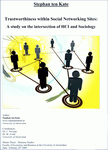Afgelopen vrijdag en zaterdag vond de Nationale Carrièrebeurs plaats in de Amsterdam Rai. Aangezien ik bijna mijn tweede master op zak heb en in de orientatie- en zelfreflectie fase zit, leek het mij ook wel interessant om langs te gaan. Je weet maar nooit immers. Vooraf kon ik lezen dat er 16.000 of misschien wel 50.000 bezoekers zouden zijn, tegenover ongeveer 200 bedrijven.
Een goede voorbereiding was dus noodzakelijk om goed voor de dag te komen en ook zelf met nuttige informatie terug te komen. Daarom was ik zaterdagochtend als een van de eerste binnen en had ik de ruimte en tijd om mij te oriënteren. Na mijn stage in 2008 bij IBM recruitment ben ik ook altijd weer benieuwd naar organisaties hun arbeidsmarktcommunicatie, en voornamelijk hun inzet van sociale media.
Tijdens en na de carrierebeurs had ik gelijk wat inspiratie voor deze blog, door sociale media toepassingen van TNT en KMPG in hun arbeidsmarktcommunicatie.
Lees verder


